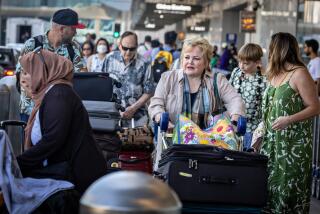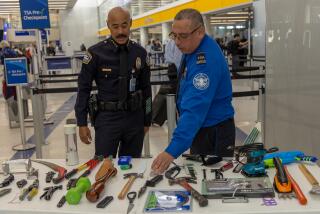All airline passengers are now checked against watch lists, Homeland Security says
- Share via
For all the protest and controversy that arose during Thanksgiving weekend over enhanced pat-down searches and full-body image scans at airports, the Homeland Security Department is celebrating the addition of a security measure that did not draw public outcry.
The department announced last week that 100% of passengers flying within or bound for the U.S. are now checked against government watch lists that are updated regularly based on the latest intelligence. The measure was recommended in 2004 by the National Commission on Terrorist Attacks Upon the United States, also known as the 9/11 commission.
Under the Secure Flight initiative, all airlines flying in the U.S. must collect the full name, date of birth and gender of every passenger so the government can check them against watch lists before the passengers can board a plane.
Domestic carriers were required to comply by Nov. 1, and they all did so by June, according to the Transportation Security Administration. And international airlines, whose deadline is Dec. 31, all complied by Nov. 30, the agency said.
Despite some airline industry experts’ fears that the requirement would lead to delays and headaches at the nation’s airports, the TSA said it has so far improved airline security, including on Thanksgiving weekend, without creating any problems.
“The entire process throughout the holiday weekend was smooth, with minimal waits across the country,” TSA spokesman Nico Melendez said.
He said Secure Flight is “a key component” of the TSA’s efforts to keep airline passengers safer, along with enhanced pat-down searches and increased use of full-body image scanners.
• Fliers are still budget-conscious
For airlines, the annual Zagat survey of airline passengers acts as a barometer on the attitude of the flying public.
This year, the survey of 8,000 passengers showed that — to no one’s surprise — people continue to be careful about spending when booking a flight and when taking a trip.
For example, when asked to select the factors most important in choosing a flight, 55% of the passengers surveyed said ticket price. That was down from 61% last year but up from 47% in 2007, before the recession took hold.
Airline passengers continue to do what they can to avoid new airline fees for checked luggage. Nearly half (45%) said they try to book with airlines that don’t charge for checked luggage, and 42% said they use frequent flier rewards to get the fees waived, according to the survey.
And clearly, the best way to spend less on flying is not to fly. Of those surveyed, 30% said they are flying less than they did before the nation’s economic tailspin began, and only 9% said they are flying more. The other 61% said they are traveling by air as often as they did before the recession.
• Counting the calories in airplane food
For fliers who worry about their waistlines as well as their bottom lines, a public health advocate is weighing in on the nutrition of airline food.
Charles Stuart Platkin, editor of DietDetective.com and a professor at the CUNY School of Public Health at Hunter College, has rated the snacks and meals offered at the nation’s largest airlines.
United Airlines ranked highest on Platkin’s list. He praised the airline’s turkey sandwiches, chicken Caesar salads, fruit trays and yogurt parfait.
Platkin gave US Airways his lowest ratings, saying its French toast sandwich breakfast box is “very high in calories and offers little in terms of nutrition.”
US Airways took exception to Platkin’s criticism. Said airline spokesman Derek Hanna: “We work closely with our caterer to ensure that the food and snack items we serve to our customers are fresh, high quality and healthy.”
More to Read
Inside the business of entertainment
The Wide Shot brings you news, analysis and insights on everything from streaming wars to production — and what it all means for the future.
You may occasionally receive promotional content from the Los Angeles Times.










